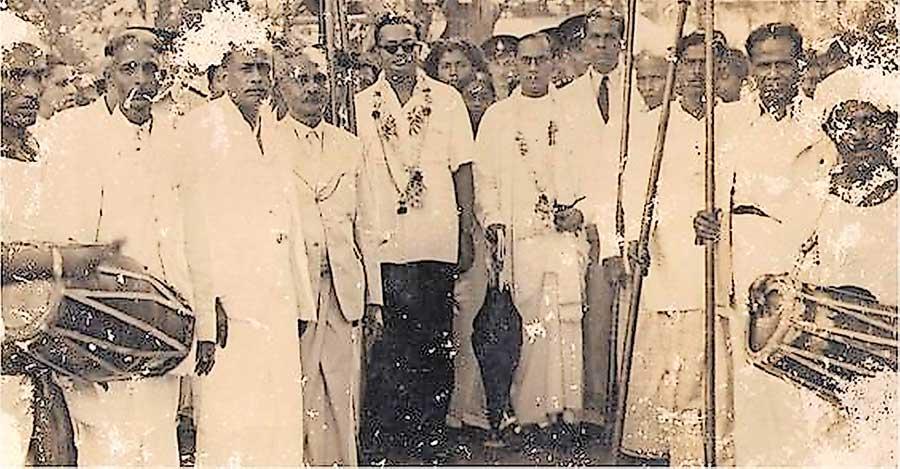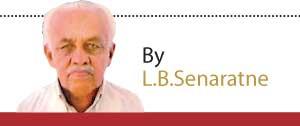Reply To:
Name - Reply Comment
 SWRD Bandaranaike is received by the people during a visit to Kandy
SWRD Bandaranaike is received by the people during a visit to Kandy
The political arena in Sri Lanka changed with the 14-minute speech of S.W.R.D.Bandaranaike (SWRD) after he crossed the floor of the House of Parliament on July 12, 1951. The day before yesterday (July 12) marked 70 years after that memorable incident took place in Sri Lankan in politics.
he crossed the floor of the House of Parliament on July 12, 1951. The day before yesterday (July 12) marked 70 years after that memorable incident took place in Sri Lankan in politics.
Though many would not agree S.W.R.D had certain principles that people did not understand. Firstly his colleague at Oxford H.Sri Nissanka, who was one of the members of the debating team at Oxford, called on S.W.R.D. to head the Government while D.S.Senanayake led the UNP. He is said to have profusely thanked Nissanka. He eventually crossed the floor of the House.
"In the course of the meeting S W.R.D said “your name is also added to the Party ( Thamusege namath dala theyenawa )- gesturing to Nissanka"
There are a number of stories about why he crossed over from the UNP to form a separate Party.
Why did he choose the ‘hand’ as the symbol? Could someone unravel this emblem, but I was there to find why the ‘hand’ was made the symbol. The reason was explained to Nissanka and Bernard Aluvihare; the prime supporters of Bandaranaike.
The first form of organising an activity of the SLFP was held at a committee cum office at Bowala, my village.
After having an initial education in Colombo this writer moved to his mother’s home at Bowala. This was the time Ceylonese feared an invasion by the Japanese.
Round about this time my father, after having a bath at our spout, came home and told my mother to have some tea ready and serve it using the ‘best tea set’ “ - a Johnson and Johnson.
My father got ready wearing his China silk trouser; which is set aside for special occasions. He was ready to meet his ‘important visitor ‘
Around ten in the morning a foursome were making their way to our home.
My father came out onto the steps and greeted the visitors. We were told by our parents not to disturb these visitors.
My father was asked to attend a meeting in the afternoon, but he didn’t oblige.
Our curiosity knew no bounds and we went to the Gangawata Korale Village Committee Office and the meeting was in progress.
The Village Committee met at a small space. My brother P.B.S.Godamunne, L.B.Ratnayake and one Ratnayke, all sudents at Kingswood, hung on to the iron mesh while witnessing the meeting. In the course of the meeting S W.R.D said “your name is also added to the Party (Thamusege namath dala theyenawa)- gesturing to Nissanka. His first name ‘Sri’, I believe, was used when naming the party ‘Sri Lanka Freedom Party’. Then he went on to speak about the symbol and explained why the hand was chosen as the symbol. It has a deep meaning which most of us have forgotten.
"His first name ‘Sri’, I believe, was used when naming the party ‘Sri Lanka Freedom Patty’. Then he went on to speak about the symbol and explained why the hand was chosen as the symbol. It has a deep meaning which most of us have forgotten"
At this meeting, another important figure was Bernard Aluvihare. Later he broke away and contested under the UNP ticket in Matale.
Both Nissanka and Aluvihare’s homes in Colombo were given away to Buddhist institutions.
It was left to Prime Minister Mahinda Rajapaksa to name Maya Avenue- where Nissanka lived- as H.Sri Nissanka Mawatha, if I remember right.
At that meeting, held at Bowala, the others present were A.P.Jayasooriya, D.A.Rajapakse and a few others. Aluvihare and Nissanaka were prominent figures.
It is on record that around 42 others crossed the floor on July 12, 1951; perhaps to make a better Sri Lanka.
S.W.R.D.speaking at the United Nations’ 11th UN General Assembly said: “My country is a small one, a weak one and a poor one, but I venture to think that today, particularly in an organization such as this, the service that a country can render – that a member can render – is not to be measured alone by the size of that country, its population, its power or its strength.
This is an organization which expresses itself most effectively by bringing to bear a certain moral force, the collective moral force and decency of human beings”.